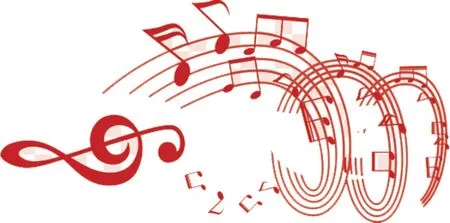A Portrait of Handel(Excerpt)
By

They used to call him the Great Bear.He was gigantic: broad, corpulent,with big hands and enormous feet; his arms and thighs were stupendous.His hands were so fat that the bones disappeared in the flesh, forming dimples.He walked bow-legged, with a heavy, rolling gait, very erect, with his head thrown back under its huge white wig, whose curls rippled heavily over his shoulders.He had a long horse-like face, which with age became bovine2bovine牛的。and swamped in fat; with pendant cheeks and triple chin, the nose large, thick and straight, the ears red and long.His gaze was very direct; there was a quizzical gleam in his bold eye, a mocking twist at the corner of his large, finelycut mouth.His air was impressive and jovial.When he smiled—says Burney—“his heavy, stern countenance was radiant with a flash of intelligence and wit; like the sun emerging from a cloud.”
[2]He was full of humour.He had a“sly pseudo-simplicity”which made the most solemn individuals laugh though he himself showed an unsmiling face.No one ever told a story better.“His happy way of saying the simplest things differently from anyone else gave them an amusing complexion.If his English had been as good as Swift3乔纳森·斯威夫特(1667—1745),英国著名文学家、讽刺作家、政治家,代表作有寓言小说《格列佛游记》。’s, hisbons mots4bons mots妙语隽言。would have been equally abundant and of the same kind.”But“really to enjoy what he said one had almost to know four languages: English, French, Italian and German, all of which he mixed up together.”
[3]This medley of tongues was as much due to the fashion in which his vagabond youth was moulded, while he wandered through the countries of Western Europe, as to his natural impetuosity, which; when he sought a rejoinder5rejoinder反驳。, seized upon all the words at his disposal.He was like Berlioz: musical notation6musical notation记谱法。was too slow for him;he would have needed a shorthand to follow his thought; at the beginning of his great choral compositions he wrote the motifs in full for all the parts; as he proceeded he would drop first one part,then another; finally he would retain only one voice, or he would even end up with the bass alone; he would pass at a stroke to the end of the composition which he had begun, postponing until later the completion of the whole, and on the morrow of finishing one piece he would begin another, sometimes working on two, if not three, simultaneously.
[4]He would never have had the patience of Gluck, who began, before writing, by“going through each of his acts, and then the whole piece; which commonly cost him”—so he told Corancez—“a year, and oftener than not a serious illness.”—Handel used to compose an act before he had learned how the piece continued, and sometimes before the librettist7librettist歌词作者。had time to write it.
[5]The urge to create was so tyrannical that it ended by isolating him from the rest of the world.“He never allowed himself to be interrupted by any futile visit”says Hawkins,“and his impatience to be delivered of the ideas which continually flooded his mind kept him almost always shut up.”His brain was never idle;and whatever he might be doing, he was no longer conscious of his surroundings.He had a habit of speaking so loudly that everybody learned what he was thinking.And what exaltation, what tears, as he wrote! He sobbed aloud when he was composing the ariaHe was despised.—“Ihave heard it said”reports Shield,“that when his servant took him his chocolate in the morning he was often surprised to see him weeping and wetting with his tears the paper on which he was writing.”—With regard to theHallelujahchorus of theMessiahhe himself cited the words of St.Paul:“Whether I was in my body or out of my body as I wrote it I know not.God knows.”
[6]This huge mass of flesh was shaken by fi ts of fury.He swore almost with every phrase.In the orchestra,“when his great white periwig8periwig假发。was seen to quiver the musicians trembled.”When his choirs were inattentive he had a way of shouting Chorus! at them in a terrible voice that made the public jump.Even at the rehearsals of his oratorios9oratorio清唱剧。at Carlton House, before the Prince of Wales, if the Prince and Princess did not appear punctually he took no trouble to conceal his anger; and if the ladies of the Court had the misfortune to talk during the performance he was not satisfied with cursing and swearing, but addressed them furiously by name.“Chut, chut!”the Princess would say on these occasions, with her usual indulgence:“Handel is spiteful!”
[7]Spiteful he was not.“He was rough and peremptory,”says Burney,“but entirely without malevolence.”There was,in his most violent fi ts of anger, a touch of originality which, together with his bad English, made them absolutely comical.Like Lully and Gluck, he had the gift of command; and like them he combined an irascible10irascible易怒的,性情暴躁的。violence that overcame all opposition with a witty good nature which, though wounding to vanity had the power of healing the wounds which it had caused.“At his rehearsals he was an arbitrary person; but his remarks and even his reprimands were full of an extremely droll humour.”At the time when the opera in London was a field of battle between the supporters of the Faustina and those of the Cuzzoni, and when the twoprime donne11prima donne首席女演员。seized one another by the hair in the middle of a performance,patronised by the Princess of Wales, to the roars of the house, a farce by Colley Gibber, who dramatized this historic bout of fi sticuffs, represented Handel as the only person who remained cool in the midst of the uproar.“To my thinking”he said“one should leave them to fi ght it out in peace.If you want to make an end of it throw oil on the fire.When they are tired their fury will abate of itself.”And in order that the battle should end the sooner he expedited it with great blows on the kettledrum12kettledrum定音鼓。.
[8]Even when he flew into a rage people felt that he was laughing in his sleeve.Thus, when he seized the irascible Cuzzoni, who refused to sing one of his airs, by the waist, and, carrying her to the window, threatened to throw her into the street, he said, with a bantering air:“Now, madame, I know very well that you are a regular she-devil; but I’ll make you realise that I am Beelzebub the prince of devils!”
[9]All his life he enjoyed a wonderful amount of freedom.He hated all restrictions and avoided all official appointments; for we cannot so describe his position of teacher to the princesses; the important musical posts about the Court and the fat pensions were never bestowed upon him, even after his naturalisation as an English citizen; they were conferred upon indifferent composers.He took no pains to humour these; he spoke of his English colleagues with contemptuous sarcasm.Indifferently educated, apart from music, he despised academics and academic musicians.He was not a doctor of Oxford University, although the degree was offered to him.It is recorded that he complained:“What the devil!Should I have had to spend my money in order to be like those idiots? Never in this world!”■
人们习惯把亨德尔称为“大熊”。他身材魁梧,肩膀宽大,粗手大脚;手臂和双腿壮健有力。亨德尔双手肥胖、肉不露骨,手背上满是小坑。他走路时两腿张开,步伐沉重,左右摇摆,上身挺拔,头向后仰,顶着大号的白色假发,浓密的发卷沉甸甸地垂在肩上。他原本脸长如马,随着年龄渐长,变成了牛脸;他面孔臃肿,双颊下垂,下巴有三层厚,鼻子粗厚笔直,大耳朵红通通的。亨德尔目光直率,炯炯有神的眼睛里闪烁着好奇的光芒,有棱有角的嘴唇旁浮现出一丝笑纹。他神态活泼,令人难忘。伯尼说,当他微笑时,“严厉坚毅的面容流露出聪明机智的神情,犹如云中升起的太阳”。
[2]亨德尔富有幽默感。他有一派“貌似天真的狡黠神态”,自己一本正经板着面孔,却能把严肃持重的人逗得哈哈大笑。没有人比得上他讲故事的本领。“他能把平凡无奇的琐事讲得与众不同,让别人听得津津有味。倘若亨德尔的英语说得和斯威夫特一样好,那他的连珠妙语肯定和斯威夫特一样多。你要想欣赏他讲的故事,差不多要懂得四种语言:英语、法语、意大利语和德语,他总是把这些语言混杂在一起讲。”
[3]多种语言的混杂要归结于他年轻时养成的习惯,当时他四处游荡,足迹遍布西欧各国;同时也是他冲动狂热的天性使然,他急于接腔反驳的时候,想到什么语言就说什么。他像柏辽兹一样:觉得常用的记谱法太慢,需要一种速记法来跟上自己的思路;在谱写大型合唱曲的时候,一开始就写出所有声部的主题,写的过程中会写一个声部抛一个,接着写下一个,最后只保留一个声部,甚或单独以低音部结束;开始作曲的时候,会一口气写到尾声,然后推迟一段时间把整部作品写完,一首曲子刚完成,就紧接着写下一首,有时候还同时写两三首曲子。
[4]他从来没有格鲁克那样的耐心,格鲁克告诉科朗斯,他在动笔之前,“对每一幕都仔细斟酌,然后再把全剧衔接起来;这通常要花上一年的光景,多半还得害他生一场大病”。亨德尔常常是写出了一幕歌剧后,还不知道下面的曲调如何谱写,有时写完了一幕,下一幕的歌词还没有着落。
[5]他的创作欲望非常强烈,以至于他最终选择与世隔绝。霍金斯说:“他从来不允许自己受到无聊来访的打扰,为了记录下脑海中不断涌现的构思,他几乎闭门不出。”他的思想从不懈怠;不论在做什么事情,他都会忘记身边的环境。他习惯于大声喧哗,所以人们都知道他在想什么。他创作的时候,时而欣喜若狂,时而痛哭流涕!他在谱写咏叹调《他受人鄙视》的时候,竟然会嚎啕大哭。希尔德讲述道:“我听说仆人早上给他送热可可的时候,时常惊讶地发现亨德尔感动得泪流满面,泪水打湿了他的手稿。”谈到《弥赛亚》的《哈利路亚》大合唱,亨德尔引用圣保罗的话说:“在创作的过程中,我根本不知道到底是我自己在作曲,还是天降异象。只有上帝知道。”
[6]亨德尔大发雷霆时,庞大的身躯会气得瑟瑟发抖,嘴里不停地赌咒骂人。在管弦乐队里,“每当看到他那副大号的白色假发晃来荡去,乐手们就会浑身哆嗦”。每当合唱团员稍有疏忽,亨德尔就会朝着他们大喊一声“合唱团!”,咆哮如雷的喊声会把人们吓得跳起来。甚至在卡尔顿宫排演清唱剧时,当着威尔士亲王的面,如果亲王公主不准时驾到,他也毫不掩饰自己的怒气;倘若宫廷贵妇敢在演出过程中说长道短,他不但会赌咒发誓,还会怒不可遏地指名道姓。遇上这种时候,王妃总会宽宏大量地说:“嘘,别做声!亨德尔记仇了!”
[7]亨德尔并没有怀恨在心。伯尼说:“他尽管粗鲁专横,但完全没有恶意。就算暴跳如雷,他也会别出心裁,再加上他那口蹩脚的英语,总让人觉得滑稽可笑。像吕利和格鲁克那样,他拥有发号施令的天赋;和他们相似的是,亨德尔身上融合着两种特质,既有压倒一切反对意见的暴躁脾气,又有温和聪敏的本性,尽管会刺伤别人的自尊心,但也有力量抚平这种创伤。”在排练中,他一贯独断专行,但是他的批评和斥责却充满幽默感,让人觉得滑稽好笑。有一段时间,伦敦的歌剧院成了歌唱家弗斯蒂娜和库佐尼双方支持者的战场,甚至在威尔士王妃资助的演出中,两位歌剧红伶竟然都揪住对方的头发大打出手,引得满场观众鼓掌喝彩,科里·吉波特意写了剧本来描述这场历史上出名的打架斗殴,他认为在这场喧嚣的闹剧里,亨德尔是唯一冷静的人。他说:“照我看来,就该由着她们平心静气地打个你死我活。你要是劝她们罢手,简直是火上浇油。等她们打累了,火气自然就消了。”为了让这场打闹速战速决,亨德尔指挥乐手把定音鼓敲得隆隆作响。
[8]就连亨德尔大发雷霆时,也让人觉得他在暗自窃笑。性情暴躁的库佐尼不肯演唱他的歌曲,他就掐住库佐尼的腰,一把推到窗口,扬言要把她扔到大街上去,他带着开玩笑的神气说:“你瞧,夫人,你向来就是个女妖怪,我知道得一清二楚;可我得让你明白,我就是魔王别西卜,妖魔鬼怪的主子!”
[9]他这一生都喜爱自由自在。他讨厌一切束缚限制,对所有的官职避之不及:我们说不出他给公主王妃担任教师的掌故;即使入籍成为英国公民后,他也从未获得重要的宫廷乐职和丰厚的薪水;这些美差都落到了无足轻重的作曲家头上。亨德尔毫不费力地拿这些事情打趣;提起自己的英国同行时,免不了连讥带讽地挖苦一番。除了音乐以外,他所受教育有限,因而对学院派和学者风范的音乐家不屑一顾。他没有上过牛津大学,却被授予牛津的博士学位。据说他满口抱怨:“真是活见鬼!难不成我得自己掏钱好跟这些蠢货一个样儿?这辈子休想!”□

——为混声四声部合唱而作

